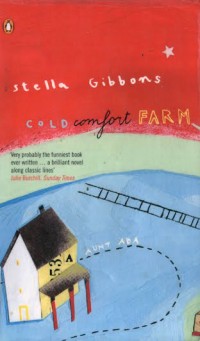The snarling cries of a wind eating its way

Cold Comfort Farm
by Stella Gibbons
I read this novel as the Guardian Reading Group picked it as the book for December and it had already sat for too long on the TBR. It’s one of those books so beloved, and described so often in hyperbolic terms, that I worried I would be disappointed. It turns out, I was not.
I suppose my biggest fear was that I wouldn’t find it funny, that the comedy would have dated. And there are aspects of the book that show their age (some racism/antisemitism and homophobia) but the comedy is still very funny.
The story is that of Flora Poste, who is well brought up, highly educated and suddenly orphaned, therefore in need of somewhere to live. Eschewing all the easy options available from her various friends in London, she writes to all her distant relatives and accepts the offer that sounds the strangest and least appealing – Cold Comfort Farm near Howling in Sussex, with the wonderfully named Aunt Ada Doom and her large family.
Flora is a busybody and immediately decides that these strange parochial relatives, with their gloomy demeanour and dislike of cleaning, need straightening up, so she sets herself the challenge of sorting them all out. And it’s a big challenge. From the lustful young man Seth, who gets the serving girl pregnant every spring, to doddering old farmhand Adam, who fails to notice when hoofs and horns fall off his beloved cows, to raving old Ada Doom herself, who never leaves her room yet wields a strange power over the farm, which may or may not be related to that fateful night when she saw something nasty in the woodshed.
“Aunt Ada Doom sat in her room upstairs…alone. There was something almost symbolic in her solitude. She was the core, the matrix; the focusing-point of the house—and she was, like all cores, utterly alone. You never heard of two cores to a thing, did you? Well, then”
Oh, and I should also mention that this is set in a near future (or what was near future at the time it was written), so it has a touch of SF mixed in there. It’s quite subtle but there are small details, especially toward the end – video phones, airmail literally dropped at the front door, personal planes to the nearest field – which add an extra level of strangeness. I’m not quite sure what the purpose of the future setting was – perhaps to make the strong female lead and satire excusable in some way?
“‘She – she’s mad.’
The word lay between them in the indifferent air. Time, which had been behaving normally lately, suddenly began to spin upon a bright point in endless space.”
If there’s one thing this book has in spades, it’s satire. Right from the author’s foreword when Gibbons tells her friend Tony that she has “marked what I consider the finer passages with one, two or three stars”, which “ought to help the reviewers” and indeed there are passages so marked throughout the book, all particularly overblown examples of satirising the prose of “country” novels such as those by George Eliot.
“**Dawn crept over the Downs like a sinister white animal, followed by the snarling cries of a wind eating its way between the black boughs of the thorns. The wind was the furious voice that was baring the dormers and mullions and scullions of Cold Comfort Farm.”
One of the questions raised on the Guardian Reading Group was whether or not we are supposed to admire Flora. She is an interfering city girl who decides that these country folk aren’t up to scratch and sets out to change them into a more acceptable “normality”. Or is that also part of the satire? She is after all in love with her cousin back in London, who happens to be a vicar, so her own story is pretty much a satire of a Jane Austen plot.
“The brittle air, on which the fans of the trees were etched like ageing skeletons, seemed thronged by the bright, invisible ghosts of a million dead summers. The cold beat in glassy waves against the eyelids of anybody who happened to be out in it.”
I like that the satire is of literary styles, rather than any people or ways of life (or at least that’s how I read it). And I must say I found Flora adorable, which is surprising because it’s in a way irritating that she is so capable and right about everything, but then that also makes her a brilliant strong female character. And she wasn’t the only surprise for me. Most of the characters begin as almost surreal fairytale types but become human as you get to know them (or should that be as Flora works her magic?).
I really enjoyed this book and can definitely see myself returning to it. The question now is do I seek out the sequels that Gibbons wrote, which are by most accounts good but not as good, or leave it at this, the pinnacle of her ability?
First published 1938 by Penguin Books.
Source: I bought it secondhand, probably from a charity shop.
Phew, good job you liked it, or I’d have been worried!
…I picked up ‘Conference at Cold Comfort Farm’ from a charity shop not long back, and it is indeed lacking in the perfect magic of CCF. But it’s an interesting take on the brave new welfare state, akin to Betjeman’s Planster’s Vision, if only in its hostility. Having sung it’s praises so faintly, I offer it to you if you wish.
noooooo! Ignore that damn apostrophe there! Oh the shame
Dru I shall indeed ignore the offending apostrophe 🙂 And I might just take a look at Conference at Cold Comfort Farm (the title sounds promisingly scathing) but I have a month or two’s reading all lined up right now.